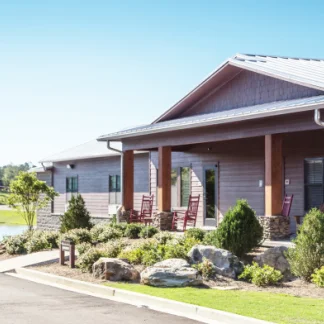Oxford Treatment Center
Etta, Mississippi, 297 CR 244, 38627
Available Programs
- Adult program
- Program for men
- Program for women
- Young adult program
Insurance and Financial
- Self-pay options
- Private insurance
- Medicaid
About this Facility
Oxford Treatment Center, in Etta, Mississippi, is a luxury, 12 step focused drug and alcohol rehab for adults. They offer medically supervised detox, dual diagnosis care, and inpatient, outpatient, and aftercare services. Their primary treatment modalities combine psychotherapy with evidence based experiential therapies, including equine and creative arts therapies.
Oxford Treatment Center is a luxury, 12 step focused addiction recovery facility for adults in Etta, Mississippi. They offer specialized programming for young adults and persons with co-occurring addiction and mental illness.
Clients undergoing detox at Oxford Treatment Center receive round the clock medical supervision. FDA approved medications may be prescribed to ease withdrawal symptoms and prevent potentially serious complications.
The inpatient program at Oxford Treatment Center allows clients to focus on their recovery in a private, home like environment with premium amenities, including a 110 acre campus in a wilderness setting and featuring lakeside views and hiking trails. Clients engage in intensive, trauma informed individual, group, and family counseling, as well as recovery focused life skills training. The program also prioritizes experiential therapy and offers an array of complementary treatment options, including equine therapy, recreational therapy, art therapy, and music therapy,
Oxford Treatment Center promotes clients’ long term recovery through a robust continuum of care aligned with clients’ evolving needs. Their levels of care include partial hospitalization (PHP), intensive outpatient (IOP), standard outpatient, sober living, and aftercare programming. In addition to ongoing counseling, recovery education, and complementary care, clients receive individualized aftercare planning and support, including peer coaching, career counseling, 12 step program induction, and referrals for medical, mental health, and social service programs.
Oxford Treatment Center is accredited by CARF and the Joint Commission. They accept private insurance, Medicaid, and self pay.
Contact us for more information: (662) 281-9992

Contact Oxford Treatment Center
Connect with Oxford Treatment Center by calling their admissions team directly.
(662) 281-9992 Website Get Directions